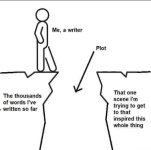Jackie.Hikaru
See you space cowboy
- Joined
- Dec 24, 2019
- Posts
- 1,154
I don't think I ever feel like I lose control of the story I'm writing, but the way I like to think about it is that sometimes a favorable wind has picked up that'll take me in the direction I want to go. I'm still in control, so to speak, but I'm also at the mercy of the wind.
When a story feels like it's going nowhere, it's like I'm on a steam boat having to constantly shovel coal to get the damn thing moving. I might get to the end but I'll probably hate the trip. And there's no guarantee the destination is worth it.
When a story feels like it's going nowhere, it's like I'm on a steam boat having to constantly shovel coal to get the damn thing moving. I might get to the end but I'll probably hate the trip. And there's no guarantee the destination is worth it.
